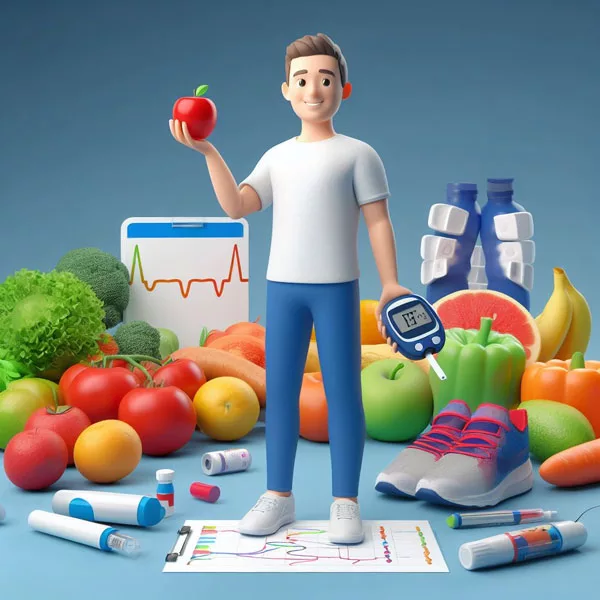Managing Diabetes in Retirement: A Comprehensive Guide to a Healthier Lifestyle
Table of Contents
Introduction
Retirement is often seen as a time to relax, travel, and indulge in hobbies. However, for many seniors, it’s also a crucial time for managing diabetes.
Understanding how to balance the joys of retirement with the responsibilities of health can make all the difference.
In this guide, we’ll delve deep into the world of diabetes management for retirees, offering tips, insights, and strategies to ensure you enjoy your golden years to the fullest while keeping your health in check.
Understanding Diabetes
Diabetes, often referred to as the ‘silent killer’, is a condition where the body either doesn’t produce enough insulin or can’t effectively use the insulin it produces.
There are two main types: Type 1, where the body doesn’t produce insulin at all, and Type 2, where the body doesn’t use insulin properly. The latter is more common, especially among seniors. At its core, diabetes revolves around blood sugar levels and how the body manages it.
The Role of Diet in Managing Diabetes
Remember the old saying, “You are what you eat”? Well, when it comes to diabetes, your diet plays a pivotal role.
Best Food for Diabetes Control
A balanced diet is crucial. Foods rich in fiber, like whole grains, beans, and lentils, are excellent choices. Vegetables, especially non-starchy ones like spinach, carrots, and broccoli, should be a staple.
Fruits, in moderation due to their natural sugars, can also be included. And let’s not forget about lean proteins like chicken, fish, and tofu. On the flip side, it’s wise to limit foods high in added sugars, unhealthy fats, and sodium.
Exercise and Its Impact on Diabetes
If diet is one side of the diabetes management coin, exercise is the other.
Managing Diabetes with Diet and Exercise
Regular physical activity can help increase insulin sensitivity. This means your body will need less insulin to transport sugar into your cells. For seniors, exercises like walking, swimming, or even yoga can be beneficial.
The key is consistency. And remember, always consult with a healthcare professional before starting any new exercise regimen.
Lifestyle Changes for Effective Diabetes Management
Beyond diet and exercise, other lifestyle factors play a significant role in managing diabetes.
Lifestyle Changes for Diabetes Type 2
Stress, believe it or not, can affect your blood sugar levels. Finding ways to manage stress, be it through meditation, hobbies, or simply spending time with loved ones, can be beneficial. Regular health check-ups are a must.
Monitoring blood sugar levels, keeping track of medications, and ensuring you’re on the right path is crucial. And let’s not forget about the importance of a good night’s sleep and staying hydrated.
Crafting a Diabetes Management Plan
Having a plan is like having a roadmap for a long journey. It guides you, keeps you on track, and ensures you reach your destination safely.
Diabetes Management Plan
Start by setting clear, achievable goals. Whether it’s maintaining a specific weight, keeping blood sugar levels within a certain range, or even something as simple as walking 30 minutes a day.
Regularly consult with healthcare professionals. They can provide guidance, monitor your progress, and make necessary adjustments to your plan. Remember, flexibility is key. As your health changes, so should your plan.
Guidelines and Tips for Optimal Diabetes Control
There’s a wealth of information out there on managing diabetes. But how do you separate the wheat from the chaff?
Diabetes Management Guidelines
Globally recognized guidelines, such as those from the World Health Organization or the American Diabetes Association, provide a solid foundation. They offer evidence-based recommendations that can be trusted.
Tips for Diabetes Control
Here are some easy-to-follow tips:
- Monitor blood sugar levels regularly.
- Take medications as prescribed.
- Stay active, both mentally and physically.
- Watch your diet, but don’t deprive yourself. Moderation is key.
- Stay informed. The more you know, the better equipped you’ll be.
Conclusion
In conclusion, managing diabetes during retirement might seem daunting, but with the right approach, it’s more than manageable. It’s an opportunity to live your best life.
So, embrace the challenge, arm yourself with knowledge, and enjoy those golden years to the fullest!
Frequently Asked Questions
What are the first steps in managing diabetes during retirement?
Begin with a comprehensive check-up with your healthcare provider. Understand your current health status, get your blood sugar levels checked, and discuss any changes in medication or lifestyle.
How important is diet in diabetes management?
Diet plays a pivotal role. Consuming a balanced diet with controlled carbohydrates can help maintain stable blood sugar levels. It’s advisable to consult a nutritionist who can provide a tailored meal plan.
Can I still travel if I have diabetes?
Absolutely! Just ensure you carry your medications, monitor your blood sugar regularly, and make provisions for healthy meals.
Are there specific exercises recommended for seniors with diabetes?
Low-impact exercises like walking, swimming, and yoga are beneficial. However, always consult with a fitness expert or your doctor before starting any exercise regimen.
How often should I monitor my blood sugar levels?
The frequency can vary based on the type of diabetes and your current health status. Typically, those on insulin might need to check more often. Always follow your doctor’s advice.
What are the signs that my diabetes isn’t well-managed?
Frequent thirst, unexplained weight changes, constant fatigue, and blurred vision are some signs. If you experience these, consult your healthcare provider immediately.
Can stress impact my blood sugar levels?
Yes, stress can elevate blood sugar levels. It’s essential to find stress-relieving activities like meditation, reading, or hobbies to maintain a balanced mental state.
Are there any new diabetes management guidelines I should be aware of?
Medical guidelines can evolve. It’s a good practice to stay updated by regularly consulting with your healthcare provider and attending diabetes workshops or seminars.
What foods are best for diabetes control?
Foods high in fiber, like whole grains, leafy greens, and certain fruits, are excellent. Lean proteins, nuts, and seeds are also beneficial. Limit processed foods and those high in sugar.
How can lifestyle changes benefit type 2 diabetes management?
Lifestyle changes, including a balanced diet, regular exercise, stress management, and avoiding tobacco and excessive alcohol, can significantly improve blood sugar control and overall well-being.
Remember, while these answers provide a general overview, always consult with a healthcare professional for advice tailored to your specific situation.




